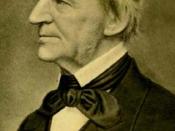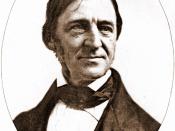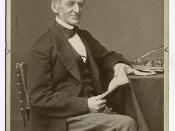Ralph Waldo Emerson'sSelf Reliance as a Virtue
In Ralph Waldo Emerson'sSelf Reliance, the way Emerson portrays actual self-reliance varies slightly with the conventional definition of the term. Emerson was the center of the American transcendental movement and believed individuality and self-confidence to be among life's most valuable virtues. Transcendentalists define self-reliance as confidently following whatever one's conscience tells them to do at any particular time. The dictionary definition of self-reliance is reliance on oneself or one's own powers and resources or, more simply put, independence. How do these two views vary and which, if either, is more valid or acceptable in today's society? This paper will discuss and analyze both Emerson's transcendentalist view and the more orthodox meaning of the term self-reliance.
In Self Reliance, Emerson says, "A man should learn to detect and watch that gleam of light which flashes across his mind from within, more than the lustre of the firmament of bards and sages.
Yet he dismisses without notice his thought, because it is his. In every work of genius we recognize our own rejected thoughts: they come back to us with a certain alienated majesty." (majesty, 533) By this Emerson means that one should listen to his or her own conscience, and express it without fear of rejection instead of letting the pressure of society manipulate one's views. Emerson believes that to be oneself is a virtue to all, except for the members of society who conform to others' thoughts and values without regard to their own conscience. These independent people grow hungry for other people to depend on them. They crave the attention of everyone outside of themselves or, in other words, the dependent. In contrast, self-reliant people are the independent beings-the virtuous, or those who do not count on...


